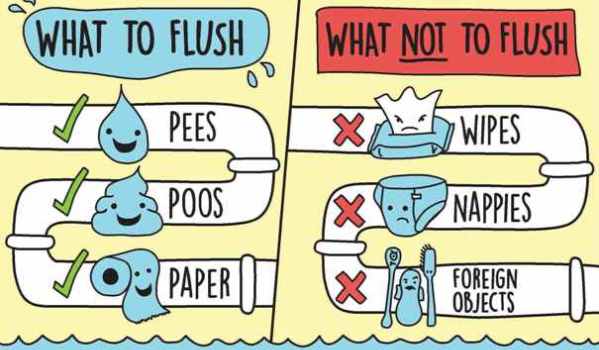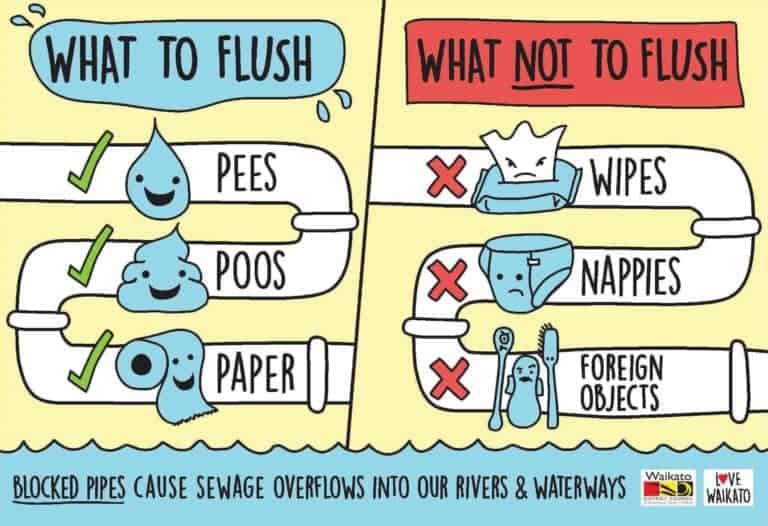Waikato District Council news
You don’t need to engage your brain much to go to the toilet or do the washing up.
But Waikato District Council is asking its residents and ratepayers to do exactly that as it embarks on a public education programme all about wastewater.
Wastewater is the water that is disposed of into sewer pipes from homes and business. It comes from toilets, sinks, showers, washing machines and industrial activities.
Council is currently running its Wastewater Overflow Continual Improvement Programme which is an extensive package of work that involves a series of projects that will improve its wastewater infrastructure.
One of the more surprising statistics that the community may not be aware of is that a staggering 80% of wastewater overflows in the Waikato district from 2014-16 were caused by blockages.
The main causes of these blockages are two-fold:
- Foreign objects such as wipes, clothing, sanitary pads and nappies being flushed down toilets.
- And grease, oil and food scraps being poured down the kitchen sink.

Sewer pipes are generally only 15 to 20cm in diameter and clearly not designed to carry objects like wipes, nappies and sanitary pads.
If cooking oil or grease from cooking meat is poured down the sink, it solidifies as it cools into a disgusting mass of congealed fat, sometimes referred to as fatbergs.
As this is happening, foreign objects like wipes get stuck on to the lumps of fat and that causes the lumps of fats to grow, eventually blocking a pipe and causing a spillage of sewage on to land or into our waterways.
While Council staff are busy improving the state of our wastewater pipes, the community can play its part in reducing the number of sewage spillages.
And it really is quite simple.
Only flush the three P’s down the loo – pees, paper (of the toilet variety) and poo.
Dispose of things like wipes, nappies and sanitary pads in the rubbish bin.
And we should all pull the plug on pouring oil, cooking fats or food scraps down the kitchen sink.
You can soak up leftover oil with paper towels or let grease from cooking meat solidify in a container and put them in the bin.
Basically the message in the kitchen is – don’t forget you oughta, pour nothing but water down the drain.
Sewage spillages cost everyone money. They also damage our precious environment.
If Council’s operational goals of improving our wastewater network can be combined with the community’s efforts in the bathrooms and kitchens of their own homes, it’s a win-win for the people of Waikato district and the environment that we live in and hold so dear.



well done WDC for sending the message. Do NOT put anything down the toilet except the 3 allowables of poos, wees and paper. Anything else will contribute to blocked pipes, damaged pumps and overflows of sewage into the Raglan Harbour where you and your kids swim. DONT DO IT.
Rags and foreign materials in sewers are a common world wide problem and is not new.There are pumps that can handle these materials and do not block up. Rotorua has solved this as described in this article. I have brought this to the attention of the Waikato District Council.
https://www.xylem.com/siteassets/support/case-studies/case-studies-pdf/dont-get-hot-and-bothered-get-n-pumps-896350.pdf